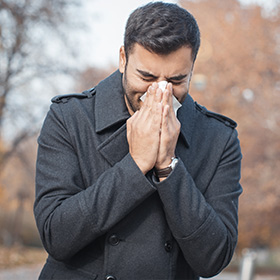- Community & News
- Heart
- Patient Stories
- Service Line
Take Control of Your Fall Allergies

With the colder weather, you might assume allergies are on the decline, but during the fall, certain allergy triggers pollinate and peak through the first frost.
From late August and into the fall, the most common allergy triggers are weed and mold, with ragweed being the most common.
Mold Counts Rise During the Fall
"Mold counts go up and down throughout the year, but they get really high in the fall when the leaves come down," says Kelly Metz MD, an allergist with Group Health. While allergens are everywhere during the fall, including hanging in the air, there are some fall activities that can increase exposure, including raking or jumping into piles of leaves.
If you're planning on taking a hayride, going to an apple orchard or pumpkin patch, or navigating a corn maze, keep in mind that crops have higher mold counts. As they break down during the harvest season, you run the risk of being more exposed to higher amounts of mold.
Enjoy the Season by Limiting Exposure
If you have known allergies, you can decrease your exposure by wiping down your face and hair when you come inside. Keeping windows closed and the air conditioner running in your car and home can also help reduce your exposure.
If you suspect you have allergies, Dr. Metz recommends starting with over-the-counter (OTC) medications. "Allergy season is a good six weeks, and if you have symptoms that last longer than that and are associated with itching, sneezing, and itchy watery eyes, those are most likely related to allergies," Dr Metz explains.
Symptom Relief is Possible
Antihistamines (Claritin, Zyrtec) are all OTC, as well as two nasal steroids (Flonase, Nasacort). "Nasal sprays require everyday use to be helpful, so using them and it not helping in a couple of days does not suggest that it's not going to be helpful in the future," Dr. Metz notes.
Skin testing is also recommended, and can be done by your allergist. It allows you to know your triggers, and when to use specific medication types to reduce your symptoms.
Related Articles
- Health & Wellness
- Primary Care
- Service Line
- Women's Health
- Community & News
- Heart
- Patient Stories
- Service Line
- Treatments